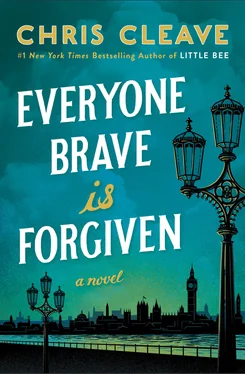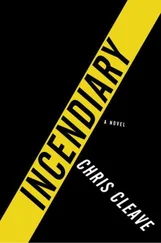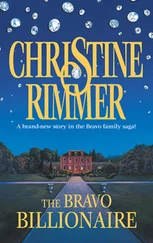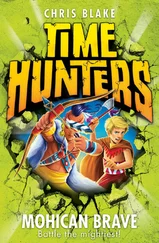He washed off the parade grime by sponging himself from his metal basin. He put on a fresh shirt, and since there was half an hour before Christmas lunch was to be served, he visited the men in their mess room. Post would have come for them too, and one couldn’t second-guess the mood of the men. Airmail had the particular violence of recency — it might leave them upbeat, or homesick, or a queer mix of the two — and so it was prudent for their officer to drop by and project a soothing equanimity. Sweethearts might blow cold or hot after all, and mothers might ail or improve, but the 3.7-inch heavy anti-aircraft gun would always provide a stable firing platform, providing that the leveling jacks on each corner of its carriage were competently deployed. This was the sentiment an officer should diffuse.
He spent a brisk twenty minutes with the men, made a joke of their minor gripes and a note of their major ones, and reached the officers’ mess in time for grace. Army and Navy together, they were sixty seated at two long tables with Lieutenant Colonel Hamilton presiding. Alistair was last to arrive and he hurried to his place, nodding his apology. Hamilton returned an affable nod, then bowed his head in prayer.
“Lord,” he said, “on this holiest of days, we thank you for food and ammunition. May our ships get through and the enemy’s get lost.”
They all said “Amen” and then the orderlies brought in something that the cook had made out of bread crumbs and canned malevolence.
Alistair lifted the corner of his with a fork. “I don’t know whether to put mustard on it or marmalade.”
“Or whether to eat it or give it a Christian burial,” said Simonson. “Did Santa bring you any post?”
“Not this time.”
“Maybe you weren’t nice. Cheery bastard keeps a list, you know.”
“Whereas you…?”
Simonson twirled his knife like a swagger stick. “I had three letters from two girls. They both think they’re the only one, of course.”
“I’m sure you’re the only millionaire they write to.”
“You don’t know the right sort of girl, is your problem. When we go on leave, I’ll introduce you around town.”
“I fear that your sort of girls would cut my poor body to ribbons, simply by using their accents.”
Simonson ignored him. “ ‘Of course if I can just make major before we go back, then my damned brother shan’t have the last laugh after all. When one is a major dear god the women one can have! I shall bag a gorgeous debutante and parade her in silks before dear Randolph’s hag of a wife.”
“I suppose it’s lucky the Germans started all this for you.”
Simonson frowned. “Is everything quite all right? You seem out of sorts.”
“I’m weary from all the excitement.”
“Damn it, Alistair, if you get all out of shape over a brass band, wait until you see some real action.”
“Do remind me to tell you about my trip to France, one day.”
“Exchange visit, was it?”
“We exchanged withering fire, if that counts.”
“And do you still keep in touch?”
“Oh yes. You see, I’m hoping to go back one day.”
“But in all seriousness, what’s wrong?”
For a moment Alistair considered telling him. But of course, it wasn’t the right thing. The war, after all, was a legal riot and a bright pageant and a marvel of near-misses. It was a perfect adventure until proved otherwise, and so it would hardly be a kindness, on Christmas Day, to produce evidence. One pulled crackers for the snap of their mild detonation.
Simonson patted him on the back and told him to buck up, and they ate with the chatter of their brother officers around them. For dessert the cook had turned up tinned apricots. They had them in the smallest bowls, but the fruit still looked lost. Each officer had exactly two and a half little apricot halves in a quarter-inch of clear syrup. They drank water from the fort’s well, which tasted of its own yellow limestone sides and whatever Turks and Moors had been thrown down there over the centuries.
Hamilton stood and tapped his glass for silence. “The King.”
They all rose. “The King.”
They drank his health in well water and left in ones and twos, hungry.
Alone, Alistair set Tom’s jar of blackberry jam in the arrow loop window and stared at it until a thin moon rose over the sea.
IN THE PLACE THEY had made for him in the chorus at the Lyceum, with twelve singers to his left and eleven to his right, Zachary stood in the red glow of lights that cast fire over a great painted backdrop of London. Its monuments were shattered, its walls breached.
In front of him, at center stage, the new Interlocutor spoke to the audience in a deep voice modeled on Zachary’s father’s. Staring at the man’s back, seeing him silhouetted in the red light, Zachary believed that it really could be his father. He tried to make it true by force of will. He did not want to imagine it was impossible. His father had vanished and left no body behind, like an illusionist or a saint.
But every time the new Interlocutor spoke, Zachary knew his father was gone. “And so, ladies and gentlemen, for this our final number tonight, we remember all those who have perished in this beloved city of ours, the city of mankind. And we remember that there is another city, both identical to ours and superordinate to it, where death has no dominion.”
The chorus began the hymn, and Zachary joined in as best he could. As they sang, the floodlights brightened, and in their soft glow a new backdrop was revealed: London, rebuilt and restored — but more than that. Every spire was taller, every bridge broader, each old familiar landmark improved. As the red floods brightened they were no longer flames but the glow of the sunrise. Yellow and white lights joined the red, until eternal London shone in the full light of day. As the singers threw back their heads to raise the final chorus, the audience rose to its feet. Zachary felt nothing, except perhaps a dull surprise that they bought it.
When the curtain came down, the manager took him aside. They stood in the wings while from the auditorium came the muttering, shuffling sound of the audience departing.
“You winning, big man?” said the manager.
Zachary smiled. “Sure.”
“Because from where I stood, I had twenty-three souls in my chorus, and then I had you.”
“I’m sorry. I’ll try harder.”
“You do that. Happy Negroes, that’s what we serve here. One sad coon in my chorus, it’s a hole in my bucket. All the magic leaks away, you know?”
Zachary shrugged. “Maybe I can take a break.”
“And do what? So long as you’re for sleeping in my basement, I’m for getting some work in return.”
“I could play piano in the interval.”
“With that long face? I’d sooner give the gig to a German.”
“I could bus the tables, then.”
The manager gave a weary look. “I’ve got forty kids queuing up for that chorus. I’d just as soon take you off it, but all my players would say ‘Give the boy a slot, you owe it to his father.’ And before I know it I’ve traded one sad face for nine. So come on, why won’t you sing?”
Zachary shrugged again and said nothing.
“You shy? Because you’ve got a nice voice. I wouldn’t march you down to Parlophone to cut a disc, but I wouldn’t pour lead in my ears either.”
“It isn’t that.”
“What, then? This is your break. You’d rather the street?”
Zachary hung his head. “I’d rather something.”
The manager laughed. “Think if you hold out long enough I’ll open up my other box of jobs for Negroes who can’t write their name? What is it you’re holding out for? Pope, or prime minister?”
Читать дальше












